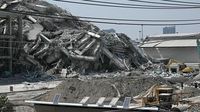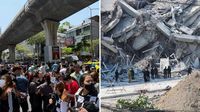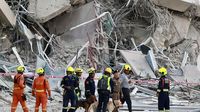On March 28, 2025, a severe earthquake measuring 7.7 on the Richter scale struck Southeast Asia, primarily affecting Myanmar and Thailand. The epicenter of the quake was located in Myanmar, but the tremors were felt across a wide area including Bangkok, parts of India, China, and even as far as Vietnam. The earthquake has led to a state of emergency being declared in both Bangkok and six regions of Myanmar, as authorities grapple with the immediate aftermath of the disaster.
According to initial reports from hospitals in Myanmar's capital Naypyidaw, approximately 21 fatalities have been confirmed, with expectations that this number may rise as rescue operations continue. Hundreds of individuals have also sustained injuries in both Myanmar and Thailand, prompting urgent calls for medical assistance. General Zaw Min Tun, spokesperson for Myanmar's military junta, stated that numerous injured individuals are arriving at hospitals, which are in dire need of blood donations.
The German Foreign Office has issued a warning to its citizens currently in Thailand, urging them to exercise caution and stay informed about the situation. Their updated travel advice encourages German nationals to follow local news and heed any behavioral instructions from local authorities, travel providers, or hotels. Citizens are also advised to register on the ministry's crisis prevention list, known as ELEFAND, to facilitate communication in case of an evacuation or other emergency measures.
Oliver Heidbach, a geophysicist from the GFZ (German Research Centre for Geosciences), confirmed that aftershocks are likely to occur following the initial quake. He indicated that these aftershocks may decrease in frequency and intensity over time, but travelers should remain vigilant. The German Travel Association (DRV) reported that several thousand German tourists are in Thailand, although very few are currently in Bangkok. Popular beach destinations such as Phuket, Khao Lak, and Ko Samui are reportedly unaffected by the earthquake.
Travel operators are actively reaching out to their guests to provide updates and guidance on the situation. In cases where a trip may need to be cut short due to safety concerns, these companies have crisis management teams in place to assist travelers with transportation to airports and arranging return flights. If the hotel is deemed unsafe, they will work to secure alternative accommodations.
For those travelers whose trips to Thailand are imminent, it is advisable to contact their tour operators for the latest information and to explore options for rebooking. The DRV cautions against making hasty decisions to cancel trips independently, as doing so could incur significant cancellation fees. Travel insurance policies often do not cover natural disasters like earthquakes, so it is essential for travelers to review their insurance terms carefully.
The earthquake has not only caused physical destruction but has also exacerbated an already precarious humanitarian situation in Myanmar, which is currently embroiled in a civil war. Nearly 20 million people in the country are in need of assistance, and about 3.5 million are internally displaced due to ongoing conflict. The United Nations has previously reported that the humanitarian crisis in Myanmar was dire even before the earthquake struck.
As the situation continues to develop, images and videos circulating on social media depict the devastation caused by the earthquake, including collapsed buildings and scenes of panic among residents. Eyewitness accounts describe the moments of terror as the ground shook beneath them, prompting thousands to flee to the streets for safety.
In light of these events, the German embassy in Bangkok has published detailed behavioral tips for travelers, emphasizing the importance of being prepared for potential aftershocks and understanding the appropriate actions to take during such emergencies. The embassy is also providing a 24/7 emergency hotline for assistance.
As of now, there have been no reports of German citizens being affected by the earthquake, according to a spokesperson for the Foreign Office. However, the situation remains fluid, and the embassy continues to monitor developments closely.
The earthquake's impact is a stark reminder of the unpredictable nature of such natural disasters and the importance of preparedness for travelers in affected regions. With the ongoing civil unrest in Myanmar, the combination of these crises presents significant challenges for both local residents and international visitors alike.
As rescue and recovery efforts unfold, the international community is urged to respond to the needs of those affected by the earthquake, particularly in a region already facing immense challenges. The German government has offered assistance, with the Technisches Hilfswerk (THW) evaluating possibilities for deployment to aid in relief efforts.
In summary, the earthquake that struck Southeast Asia on March 28, 2025, has led to significant loss of life and injuries, particularly in Myanmar. The German Foreign Office's warnings emphasize the need for caution among travelers in Thailand, while the humanitarian situation in Myanmar remains critical.








